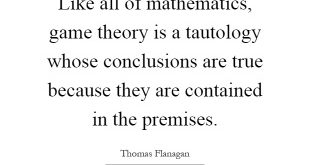Read More »
Time
from Lars Syll [embedded content] Time is what prevents everything from happening at once. To simply assume that economic processes are ergodic and concentrate on ensemble averages — and hence in any relevant sense timeless — is not a sensible way for dealing with the kind of genuine uncertainty that permeates real-world economies. Ergodicity and the all-important difference between time averages and ensemble averages are difficult concepts — so let me try to explain the meaning of these...
Read More »MMT Macro Final Exam (1/3)
from Asad Zaman During the last two semesters, I taught Macroeconomics based on a new approach which re-incorporate the history that Economists forgot (See Method or Madness?). The central idea of the course is that economic theories cannot be understood outside of their historical context. Conversely, economic history cannot be understood except by studying the economic theories (right or wrong) which were used by contemporaries to shape policy responses to historical events. The...
Read More »The lurking dangers in the internet of money
from C. P. Chandrasekhar Facebook has launched a process that would lead to the creation of a new cryptocurrency, “Libra”, in the first half of 2020. Named after a unit of weight used in ancient Rome, Facebook hopes Libra would become the dominant measure of value for transactions, at least on the internet. As is characteristic of the world of digital business that, outside of finance, has delivered the largest number of billionaires in recent decades, the creation of libra is presented...
Read More »Game theorists — people carried away by fictions
from Lars Syll Applied game theory is a theory of real-world facts, where we use game theoretical definitions, axioms, theorems and (try to) test if real-world phenomena ‘satisfy’ the axioms and the inferences made from them. When confronted with the real world we can (hopefully) judge if game theory really tells us if things are as postulated by theory. But there is also an influential group of game theoreticians that think that game theory is nothing but pure theory, an...
Read More »So much for “conservative” economics and economists.
from Ken Zimmerman In 1771 a former barber and wig maker, Richard Arkwright, opened the world’s first water-powered spinning mill at Cromford in Derbyshire. He employed 600 workers, mainly children, who could do the work of ten times that number of hand spinners. In 1775 a Scottish mathematical instrument maker, James Watt, joined forces with the Birmingham engineer Matthew Boulton to produce steam engines which could turn machinery, haul enormous loads and, eventually, propel ships and...
Read More »Lucas, Jenner, Washington, Shaw
I am thinking about modern macroeconomic methodology again. I am also thinking about the fresh water school of thought. Also I am thinking about aspirin and smallpox. I am going to attempt a nickle summary of the Lucas critique (really a half penny summary or a 5 Turkish Lira summary). Lucas argued that it was unwise to base policy on models which fit the available data, because parameters can be estimated even if they do not describe causal...
Read More »Differential inflation and full enclosure
from Ikonoclast After reading “Capital as Power” by Bichler and Nitzan, where they talk about differential accumulation, a key and salient point about our economy appears to me to be a regime of differential inflation. Clearly, differential inflation can enable differential accumulation. Economists often talk about economies as if one average inflation rate affects the entire economy. This does not seem to me to capture the situation at all. The modern (neoliberal / monetarist) economy is...
Read More »Open thread July 5, 2019
What can we learn from economic models?
from Lars Syll Some economic methodologists have lately been arguing that economic models may well be considered ‘minimal models’ that portray ‘credible worlds’ without having to care about things like similarity, isomorphism, simplified representationality or resemblance to the real world. These models are said to resemble ‘realistic novels’ that portray ‘possible worlds’. And sure: economists constructing and working with that kind of models learn things about what might happen in those...
Read More » Heterodox
Heterodox



